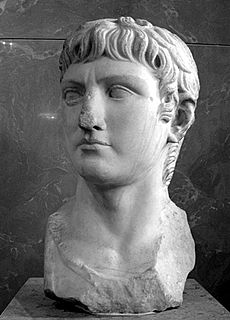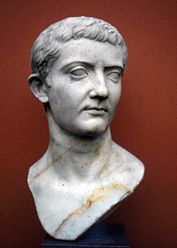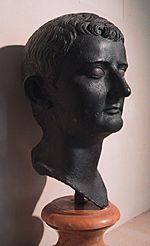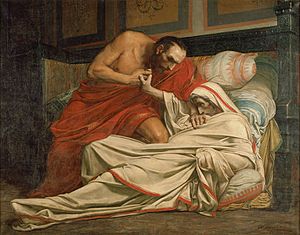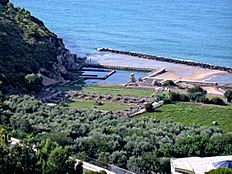Tiberius facts for kids
Quick facts for kids Tiberius |
|||||||||
|---|---|---|---|---|---|---|---|---|---|
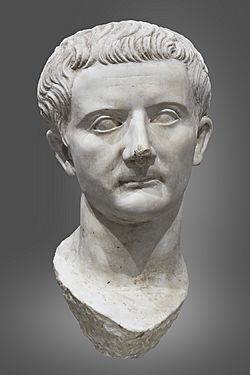
Bust, Musée Saint-Raymond, Toulouse
|
|||||||||
| Roman emperor | |||||||||
| Reign | 17 September AD 14 – 16 March AD 37 | ||||||||
| Predecessor | Augustus | ||||||||
| Successor | Caligula | ||||||||
| Born | 16 November 42 BC Rome, Italy, Roman Republic |
||||||||
| Died | 16 March AD 37 (aged 77) Misenum, Italy, Roman Empire |
||||||||
| Burial | Mausoleum of Augustus, Rome | ||||||||
| Spouse |
|
||||||||
| Issue more... |
|
||||||||
|
|||||||||
| Dynasty | Julio-Claudian | ||||||||
| Father |
|
||||||||
| Mother | Livia | ||||||||
Tiberius Julius Caesar Augustus (born November 16, 42 BC – died March 16, AD 37) was the second Roman emperor. He ruled from AD 14 to 37. He took over after his stepfather, Augustus, who was the first Roman emperor.
Tiberius was born in Rome. His father was a politician named Tiberius Claudius Nero. His mother was Livia Drusilla. Livia later divorced his father and married Augustus in 38 BC. Augustus had two grandsons, Gaius and Lucius, who were supposed to be his heirs. But they both died young. So, Tiberius became Augustus's chosen successor.
Before becoming emperor, Tiberius was a skilled diplomat. He was also one of Rome's most successful generals. He conquered areas like Pannonia, Dalmatia, and Raetia. He also temporarily took parts of Germania. These victories helped create the northern borders of the Roman Empire.
Early in his life, Tiberius was happily married to Vipsania Agrippina. She was the daughter of Augustus's friend, Marcus Vipsanius Agrippa. Tiberius and Vipsania had a son named Drusus Julius Caesar. After Agrippa died, Augustus asked Tiberius to divorce Vipsania. He wanted Tiberius to marry his own daughter, Julia, who was Tiberius's step-sister. Tiberius did so, even though he did not want to. This second marriage was not happy and they had no children. Julia was later sent away from Rome. Tiberius adopted his nephew, Germanicus, as his heir. Germanicus was a popular and skilled leader.
When Augustus died in AD 14, Tiberius became the princeps (first citizen) at age 55. He seemed to take on this big job with some hesitation. He might have felt he was not as strong a leader as Augustus.
Tiberius had a difficult relationship with the Senate. He often suspected people were plotting against him. Despite this, he was a very good administrator. He managed the empire well. After his nephew Germanicus died in AD 19, and his son Drusus died in AD 23, Tiberius became more private. In AD 26, he left Rome and let his ambitious guard commander, Sejanus, handle most of the government. Sejanus was later executed for disloyalty. After Sejanus, Macro took his place.
When Tiberius died, his grand-nephew and adopted grandson, Caligula, became emperor. Caligula was Germanicus's son. Caligula spent a lot of the money Tiberius had saved through good management. Tiberius was remembered as a serious ruler who did not really want to be emperor. He was given a grand funeral but no special divine honors.
Contents
Early Life and Family
Family Background
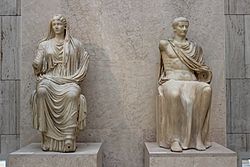
Tiberius was born in Rome on November 16, 42 BC. His parents were Tiberius Claudius Nero and Livia Drusilla. Both of his parents came from very old and important Roman families. His mother's family was also well-known.
We do not know much about Tiberius's early childhood. In 39 BC, his mother divorced his father. She then married Octavian, who later became Emperor Augustus. In 38 BC, Tiberius's brother, Nero Claudius Drusus, was born. When Tiberius was nine years old, in 32 BC, he gave a speech at his father's funeral. This speech was given from the rostra, a platform in the Roman Forum. In 29 BC, he rode in a special parade with Augustus. This parade celebrated Augustus's victory over Antony and Cleopatra at the Battle of Actium.
The Question of Succession
In 23 BC, Emperor Augustus became very sick. People worried that if he died, Rome might fall into civil war again. It was clear that Augustus needed to choose someone to take his place. Augustus seemed to favor Agrippa and Marcellus as his possible heirs. But the plan for who would rule next was not clear.
To solve this, Augustus considered several people, including Tiberius and his brother Drusus. In 24 BC, at age seventeen, Tiberius began his political career. Augustus helped him become a quaestor, which was a financial officer. He was also allowed to run for praetor (a judge) and consul (a chief magistrate) earlier than the usual age. Drusus received similar special permissions.
Public and Military Career
Early Career and First Marriage
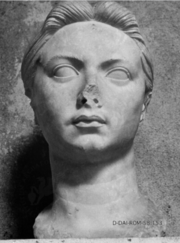
Soon after, Tiberius started working as a lawyer in court. This is likely when he became interested in Greek public speaking. In 20 BC, Tiberius was sent to the East with Marcus Vipsanius Agrippa. The Parthian Empire had captured the battle flags of Roman armies in earlier wars. After a year of talks, Tiberius led a large army into Armenia. His goal was to make Armenia a friendly state to Rome. This would help protect the Roman-Parthian border. Augustus was able to make a deal. The Parthians returned the Roman flags, and Armenia remained neutral.
Tiberius married Vipsania Agrippina. She was the daughter of Augustus's close friend and famous general, Marcus Vipsanius Agrippa. Tiberius was then made a praetor. He was sent with his armies to help his brother Drusus in campaigns in the west. Drusus fought in Gaul and along the German border. Tiberius fought against tribes in the Alps mountains and in Gaul. He conquered Raetia. In 15 BC, he found the sources of the Danube River. He returned to Rome in 13 BC and became a consul. Around this time, his son, Drusus Julius Caesar, was born.
Agrippa's death in 12 BC made Tiberius and Drusus more important for the succession. In 11 BC, Augustus asked Tiberius to divorce Vipsania and marry Julia the Elder. Julia was Augustus's daughter and Agrippa's widow. Tiberius did not want to do this because he was happily married. His new marriage with Julia was not happy. It is said that when Tiberius saw Vipsania again, he cried and asked for her forgiveness. After this, Augustus made sure Tiberius and Vipsania would never meet again.
Tiberius continued to gain power under Augustus. After Agrippa's death and his brother Drusus's death in 9 BC, Tiberius seemed to be the clear choice to succeed Augustus. In 12 BC, he was given military commands in Pannonia and Germania. These areas were very unstable and important to Augustus's plans.
Military Victories
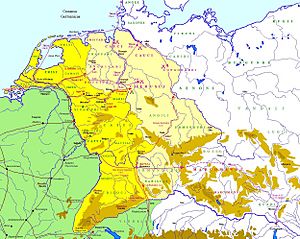
In 6 BC, Tiberius launched a two-sided attack against the Marcomanni tribe. He marched northwest from Carnuntum on the Danube River with four armies. He went through Quadi land to attack the Marcomanni from the east. At the same time, General Gaius Sentius Saturninus moved east from Moguntiacum on the Rhine River. He had two or three armies. He went through newly conquered Hermunduri land and attacked the Marcomanni from the west.
This military plan was very successful. However, Tiberius could not fully defeat the Marcomanni. He was called back to the Rhine border to protect Rome's new lands in Germania. He returned to Rome and became consul for a second time in 7 BC. In 6 BC, he was given special powers, like those Agrippa had before him. These powers gave him control in the East.
Later Life and Becoming Emperor
Retreat to Rhodes
In 6 BC, Tiberius was about to take command in the East. This would have made him the second most powerful person in Rome. But he announced he was leaving politics and moved to Rhodes. The reasons for his leaving are not fully clear. Some historians think Tiberius and Drusus were only meant to rule until Augustus's grandsons, Gaius and Lucius, grew up.
Tiberius's departure caused problems for Augustus's plans for who would rule next. Gaius and Lucius were still very young. Augustus was 57 years old and had no immediate successor. There was no guarantee that power would pass peacefully after Augustus died. Stories say Augustus begged Tiberius to stay, even pretending to be very sick. But Tiberius sailed straight to Rhodes. Tiberius later regretted leaving and asked to return to Rome many times. But Augustus always said no.
Chosen as Augustus's Heir
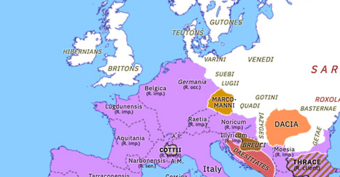
With Tiberius gone, the plan for succession depended only on Augustus's two young grandsons, Lucius and Gaius Caesar. The situation became more serious in AD 2 when Lucius died. Augustus, perhaps with some influence from Livia, allowed Tiberius to return to Rome. But he was only a private citizen.
In AD 4, Gaius was killed in Armenia. Augustus then had no choice but to turn to Tiberius. Gaius's death led to many changes in Augustus's household. Tiberius was adopted as Augustus's full son and heir. In return, Tiberius had to adopt his nephew Germanicus. Germanicus was the son of Tiberius's brother Drusus and Augustus's niece Antonia Minor. Along with his adoption, Tiberius received special powers. These powers were similar to Augustus's own authority. In AD 7, Agrippa Postumus, a younger brother of Gaius and Lucius, was disowned by Augustus. He was sent away to an island.
In AD 13, Tiberius's powers were made equal to Augustus's. This meant he was like a "co-Princeps" with Augustus. If Augustus died, Tiberius would simply continue to rule without any break or trouble. According to some historians, these important changes happened in AD 12. Augustus died in AD 14, just before his 76th birthday. He was honored with a grand ceremony and declared a god. His will was read, and Tiberius, now 55, was confirmed as his only surviving heir. Tiberius took power peacefully, with no one challenging him.
Emperor Tiberius
Early Years as Emperor
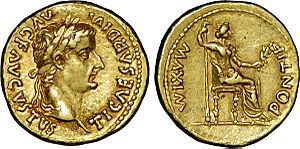
The Senate met on September 17 to confirm Tiberius as Princeps. They also offered him special titles, like "Augustus" and "Father of the country." But Tiberius already had the main powers of the Princeps. He refused the new titles. Like Augustus before him, Tiberius may have wanted to seem like a humble public servant. He wanted to show he was just an ordinary citizen serving the state. But his refusal of these honors was seen as an insult by the Roman elite. They saw it as a sign of being fake, not humble.
Some historians say Tiberius called the Senate "men fit to be slaves." There seemed to be tension between Tiberius and the Senate throughout his rule. In his first few years as emperor, Tiberius seemed to want the Senate to make decisions on their own. He did not want them to always ask him. His orders were sometimes unclear. This led to debates about what he meant, instead of quick action on his laws.
Germanicus's Campaigns
The Roman armies in Pannonia and Germania had not received the extra payments Augustus had promised them. They started to show signs of rebellion when Tiberius did not respond quickly. Germanicus and Tiberius's son, Drusus Julius Caesar, were sent with a small force. Their job was to stop the uprising and bring the armies back under control.
Germanicus took charge of the rebellious troops. He led them on a short campaign across the Rhine River into German territory. He promised them that any treasure they found would count as their bonus. Germanicus's forces took control of all the land between the Rhine and the Elbe rivers. They also took back the Teutoburg forest. This was where three Roman armies had been destroyed by Germanic tribes years before. Germanicus recovered the lost Roman battle flags. This saved the armies from the shame of losing them. These brave and successful actions made Germanicus even more popular. After returning to Rome, Germanicus was given a full triumph (a victory parade). He celebrated it in AD 17. It was the first full triumph since Augustus's own in 29 BC.
In AD 18, Germanicus was given control over the eastern part of the empire. This was a sign that he would be Tiberius's successor. But Germanicus died just over a year later. He had accused Gnaeus Calpurnius Piso, the governor of Syria, of poisoning him.
The Piso family had long supported Tiberius's family. Germanicus's death and the accusations against Piso caused problems for the new emperor. Piso was put on trial. Some accounts say he threatened to involve Tiberius. We do not know if Piso could actually connect Tiberius to Germanicus's death.
In AD 22, Tiberius shared his special powers with his son Drusus. He also started taking longer and longer trips to Campania each year. In AD 23, Drusus died in unclear circumstances. Tiberius did not seem to try to find a replacement. In AD 26, Tiberius moved to a large villa he had inherited from Augustus. It was on the island of Capri. This island was a popular vacation spot for wealthy Romans.
Tiberius in Capri and Sejanus in Rome
Lucius Aelius Sejanus had worked for the imperial family for almost twenty years. He became the commander of the Praetorian Guard in AD 15. As Tiberius became less interested in being Princeps, he relied more and more on Sejanus and the Praetorian Guard. In AD 17 or 18, Tiberius moved the Praetorian Guard from outside the city walls into Rome itself. This gave Sejanus control over 6,000 to 9,000 soldiers.
Drusus's death made Sejanus more important to Tiberius. Tiberius even called him his "Partner of my labors." Tiberius had statues of Sejanus put up around Rome. Sejanus became more visible as Tiberius spent more time away from Rome. When Tiberius moved to Capri in AD 26, Sejanus was left in charge of the government and the city of Rome.
Sejanus was not quite the next in line to be emperor. He had asked to marry Tiberius's niece, Livilla, in AD 25. But he quickly withdrew the request under pressure. Sejanus's Praetorian Guard controlled the imperial mail. This meant they controlled the information Tiberius received from Rome and what Rome received from Tiberius. However, the presence of Livia (Tiberius's mother) seemed to limit Sejanus's power for a while. Her death in AD 29 changed everything.
Sejanus began a series of trials against senators and wealthy Romans in Rome. He removed those who could oppose his power. He also increased the emperor's (and his own) money. Germanicus's widow Agrippina the Elder and two of her sons were arrested and sent away in AD 30. They later died in unclear ways. In Sejanus's actions against Agrippina and her family, Caligula, Agrippina the Younger, Julia Drusilla, and Julia Livilla were the only ones who survived.
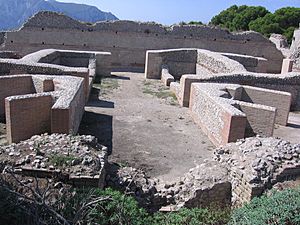
In AD 31, Sejanus held the consulship with Tiberius, who was absent from Rome. Sejanus began to make a serious move for power. It is hard to know exactly what happened. But Sejanus seemed to secretly try to gain support from families connected to the Julian family. He tried to connect himself to the Julian family line. This would put him in a position to become Princeps, or a possible regent (a ruler for a young emperor). Livilla was later found to be involved in this plot. It was revealed she had been Sejanus's lover for several years.
The plot seemed to involve Sejanus and Livilla overthrowing Tiberius. They wanted the support of the Julian family. They planned to take the Principate themselves or rule as regents for young Tiberius Gemellus or possibly even Caligula. Those who stood in their way were tried for disloyalty and quickly dealt with.
In AD 31, Sejanus was called to a Senate meeting. A letter from Tiberius was read. It condemned Sejanus and ordered his immediate execution. Sejanus and several of his friends were tried and executed within a week. As commander of the Praetorian Guard, he was replaced by Naevius Sutorius Macro.
More trials for disloyalty followed. Some historians claim that Tiberius, who had been hesitant to act early in his rule, now seemed to do so without hesitation. The families with political ties to the Julian family were hit hardest. Even government officials were affected. Anyone who had worked with Sejanus or was connected to his plans was quickly tried and executed. Their property was taken by the state.
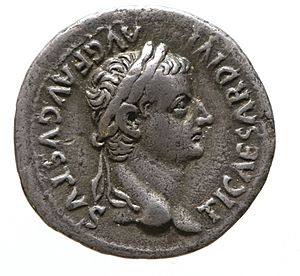
Final Years and Death
The events with Sejanus and the trials for disloyalty greatly harmed Tiberius's image. After Sejanus's fall, Tiberius stayed completely away from Rome. The empire continued to run because of the government system Augustus had set up. It did not run because of the emperor's direct leadership. Some accounts say Tiberius became very suspicious. He spent a lot of time thinking about his son's death. During this time, there was a short invasion by Parthia. Also, tribes from Dacia and Germania attacked Roman lands.
Little was done to plan for Tiberius's successor. The Julian family and their supporters had fewer members and less political power because of Sejanus. Tiberius's direct heirs were dead. Caligula, Germanicus's only surviving son, or Tiberius's own grandson, Tiberius Gemellus, were possible choices. However, Tiberius only made a small effort to make Caligula a quaestor (a financial officer) at the end of his life. This would give Caligula some standing as a possible successor. Gemellus was still a teenager and too young to rule for several years.
Tiberius died in Misenum on March 16, AD 37. He was almost 78 years old. Some rumors say that Caligula poisoned the emperor.
After his death, the Senate refused to give Tiberius the divine honors that Augustus had received. Crowds in the streets shouted, "To the Tiber with Tiberius!" (The bodies of criminals were often thrown into the river). However, the emperor was cremated. His ashes were placed in the Mausoleum of Augustus.
In his will, Tiberius named Caligula and Tiberius Gemellus as his joint heirs. Caligula's first act as Princeps was to cancel Tiberius's will.
Tiberius's Legacy
Historical Accounts
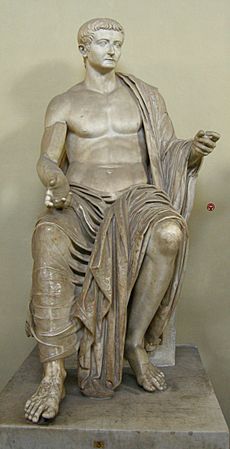
If Tiberius had died before AD 23, he might have been remembered as an excellent ruler. Even though Roman historians mostly wrote negative things about him, Tiberius left the empire with a lot of money when he died. He had nearly 3 billion sesterces (Roman coins). Instead of starting expensive wars, he chose to make the existing empire stronger. He built more bases, used diplomacy, and avoided small conflicts. This led to a stronger, more stable empire. It also made sure that the government system Augustus started would last for centuries.
Only four historians' writings about Tiberius's reign have survived in detail: Tacitus, Suetonius, Cassius Dio, and Marcus Velleius Paterculus. There are also small pieces of information from Pliny the Elder, Strabo, and Seneca the Elder. Tiberius himself wrote a book about his life, but it is now lost.
Tacitus's View
Tacitus gives the most detailed account of Tiberius's rule. His book, Annals, focuses on Tiberius for its first six parts. Tacitus was a Roman senator born in AD 56. His writing uses official Senate records and government news. He also used speeches by Tiberius and other historians' works.
Tacitus's story looks at both political and personal reasons for events. His description of Tiberius is mostly negative. It gets worse as Tiberius's rule declines. Tacitus points to the death of Tiberius's son Drusus in AD 23 as a turning point. Tacitus describes the rule of Tiberius's family as generally unfair. He says Tiberius's good qualities early in his reign were just a pretense.
Another main idea in Tacitus's writing is the balance of power between the Senate and the emperors. He also writes about corruption and the growing harshness among Rome's rulers. A large part of his account on Tiberius is about the trials for disloyalty that happened under a revived law.
Suetonius's View
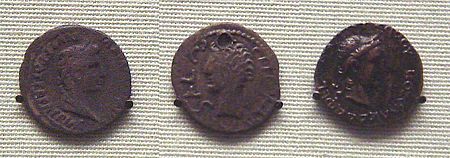
Suetonius was a Roman knight who worked in government during the reigns of Trajan and Hadrian. His book, The Twelve Caesars, tells the life stories of Roman emperors from Julius Caesar to Domitian. Like Tacitus, he used official records and other historical writings.
His account is more dramatic and full of stories than Tacitus's. He writes about Tiberius's alleged private activities while at Capri. However, Suetonius praises Tiberius's actions during his early rule, highlighting his modesty.
Velleius Paterculus's View
One of the few writings from Tiberius's time comes from Velleius Paterculus. He served under Tiberius for eight years in Germany and Pannonia as a military officer. Paterculus's Compendium of Roman History covers a long period, up to Livia's death in AD 29. His writing about Tiberius praises both the emperor and Sejanus. We do not know if this was true admiration or just being careful. Some think he was killed in AD 31 because he was a friend of Sejanus.
Tiberius, Jews, and Christians
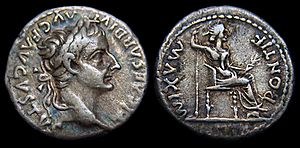
According to the Gospels, Jesus of Nazareth taught and was executed during Tiberius's reign. This was done by the authority of Pontius Pilate, the Roman governor of Judaea province. The city of Tiberias, by the Sea of Galilee, was named in Tiberius's honor. The "tribute penny" mentioned in the Bible is thought to be a silver coin of Tiberius.
During Tiberius's rule, Jewish people became more noticeable in Rome. Jewish and non-Jewish followers of Jesus began telling Roman citizens about their faith. This increased old tensions. In AD 19, Tiberius ordered Jewish men of military age to join the Roman Army. He sent the rest of Rome's Jewish population away. If they returned, they would be enslaved for life. There were no widespread Roman persecutions of Christians under Tiberius after Jesus's crucifixion in AD 30. Most scholars believe that Romans started to see Jews and Christians as separate groups later, around AD 40 or AD 70.
The Christian Church has generally had a positive view of Tiberius. Some early Christian writers said Tiberius asked the Senate to recognize Christ as a god. They claimed he mentioned evidence of Jesus's miracles and resurrection. Other Christian historians said Pilate reported Jesus's resurrection to Tiberius. Tiberius is said to have taken Pilate's report to the Senate. It is also said that Tiberius protected Christians from unfair trials by senators. However, there is no proof of such protection in Roman law. Many scholars do not believe these stories are true. The first Roman emperor listed as persecuting Christians is Claudius.
Buildings and Art
There are signs of changes made by Tiberius in the Gardens of Maecenas in Rome. He lived there after returning from his time in Rhodes. Inside a building that was likely a dining room, there are paintings on the walls. These paintings show scenes of nature and the god Dionysus. They are similar to paintings in his mother's own underground dining room.
Tiberius's palace in Rome was on the Palatine Hill; its ruins can still be seen. Tiberius began building a temple in Rome to honor the deified Augustus. He also restored the theatre of Pompey. These projects were not finished until Caligula's rule. The remains of Tiberius's villa at Sperlonga include a grotto (a cave-like structure). Inside, parts of the famous Sperlonga sculptures were found. The Villa Jovis retreat on the island of Capri has also been preserved. It is said that Tiberius had a total of twelve villas on Capri, with Villa Jovis being the largest.
Tiberius did not want to be officially worshipped as a living god. He encouraged moderation in the empire-wide worship of the deified Augustus. He set up a group of priests, the Sodales Augustales, to manage these rituals. He allowed only one temple to honor both his own spirit and that of the Senate. This temple was in Smyrna.
Tiberius in Popular Culture
Tiberius has appeared in many books, movies, TV shows, and video games. He is often a supporting character in the main story. Here are some examples:
- He is in the novel I, Claudius by Robert Graves. He is also in the BBC television series based on the book, played by George Baker.
- George R. R. Martin, who wrote A Song of Ice and Fire, said that the character Stannis Baratheon was partly inspired by Tiberius Caesar, especially Baker's portrayal.
- In the 1968 ITV historical drama The Caesars, Tiberius (played by André Morell) is a main character. He is shown in a more balanced way than in I, Claudius.
- He appears as a small character in the 2006 film The Inquiry, played by Max von Sydow.
- Tiberius also has important roles in Ben-Hur (played by George Relph) and in A.D. (played by James Mason).
- He was in the 1953 film The Robe, played by Ernest Thesiger.
- He was in the 1979 film Caligula, played by Peter O'Toole.
- He was an important character in Taylor Caldwell's 1958 novel, Dear and Glorious Physician, a book about St Luke the Evangelist.
- He was played by Kenneth Cranham in A.D. The Bible Continues.
- In the TV series Roman Empire, Tiberius was played by Craig Walsh-Wrightson. In the 2021 TV series Domina, he was played by Earl Cave.
- The search for a unique gold coin called the "Gold Tiberius" is a key part of the story in Arthur Machen's 1895 novel The Three Impostors.
Children and Family
Tiberius was married two times. Only his first marriage produced a child who lived to adulthood:
- Vipsania Agrippina, daughter of Marcus Vipsanius Agrippa (married 16–11 BC)
- Drusus Julius Caesar (born 14 BC – died AD 23) (had children)
- Julia the Elder, only daughter of Augustus (married 11–6 BC)
- Infant son, (called "Tiberillus" by modern historians), died as a baby.
See also
 In Spanish: Tiberio para niños
In Spanish: Tiberio para niños
- Caesar cut
- Clutorius Priscus
- Julio-Claudian family tree
- List of Roman emperors
- List of biblical figures identified in extra-biblical sources


